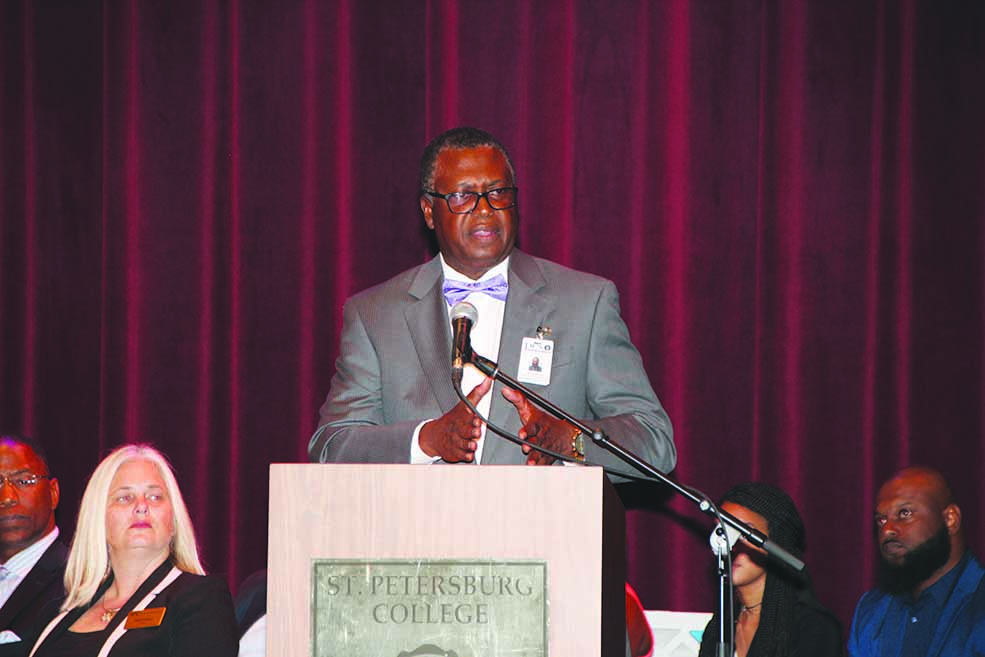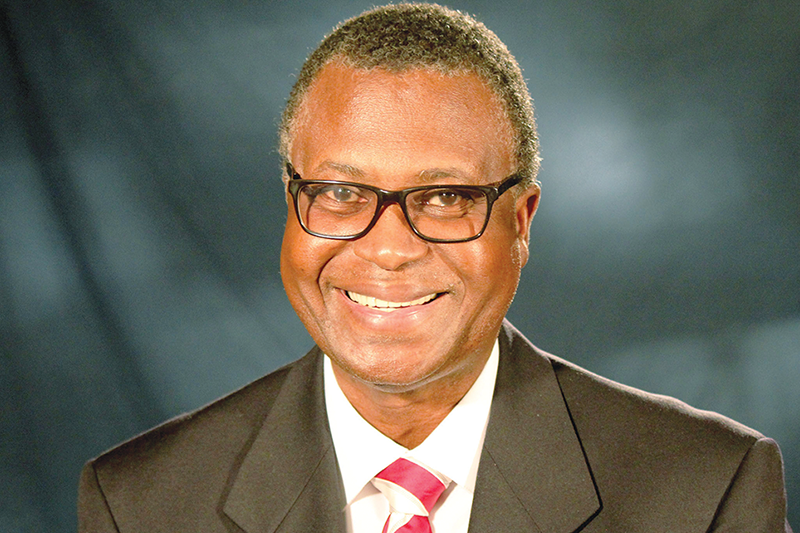Dr. Lewis Brinson
BY FRANK DROUZAS, Staff Writer
ST. PETERSBURG – Dr. Lewis Brinson, the newly appointed minority achievement officer, aims to make a difference in Pinellas County schools.
The veteran school administrator from Hillsborough County took over the new position—a first for Pinellas County—in December. One of Brinson’s main duties is to oversee the Bridging the Gap Plan, a strategy Pinellas County Schools created to close the achievement gap between African-American students and their peers.
The plan’s six key goals address black students’ graduation rates, grade level proficiency, participation and performance in accelerated courses, disciplinary infractions, eligibility for Exceptional Student Education (ESE) programs and minority hiring.
It’s one thing to have a plan, Brinson explained, but someone needs to see that it’s being carried out, adding that he likens himself to “quality control.”

Dr. Brinson at the Dr. Mac J. Williams Sr. awards ceremony last week
“I check and make sure those things that we say we’re doing are happening,” he said.
Above all, Brinson wants to ensure that black students are getting the same opportunities as white students, which includes placement in advanced classes and programs.
“The accelerated programs that mainly the white students have had the privilege of being enrolled in,” he said, “there needs to be an equal opportunity for African-American students for taking those same programs.”
Brinson pointed out that one of the first things that must be done is to restore the trust and respect between the school system and the community. In order for the Bridging the Gap Plan or any plan to work, he said, there has to be collaboration among the community, the parents and the school system.
“We have to work together,” he stated firmly. “It’s not optional. We have to work as a team, we have to work as one because all of us have to be focused on one thing, and that’s the achievement of our students. So we can’t be at odds, we can’t be pointing the finger at each other and blaming each other. We have to join hands and work together.”
He believes it is important to reach out to various groups to solicit support from the community and promote strong community engagement, but starting a dialogue is key, he stressed.
“We need to have an icebreaker where we start talking because I need to know what’s on your mind and you need to know what’s on my mind,” Brinson said.
He said it’s about going out into the community, being visible, being transparent and reaching out. Not trying to connect from the office, Brinson said it’s time to get out there in the street and talk to the people and see what they are frustrated about and how the school board can undo that frustration.
One of his aims is to help build a strong infrastructure in the community where there are institutions with programs that promote high student achievement. As far as one on one conversation, Brinson welcomes any chance to talk directly to parents.
“If you want to work together, if you have a problem, let me hear your problem,” he said. “If I can resolve it, I’ll resolve it. I will find a way to help them with their issue.”
Brinson said that he tells parents that if they do their part and he does his, they will make a difference. Admitting that it will take more than just his effort to turn things around, he refers to his framework of action as a “triangle of support” whose three angles include the parents, the community along with the church and the school.
“When all of those things become interdependent and work together, good things are going to happen,” he pointed out. “If you only just have one of the angles trying to carry all three, it’s going to be difficult.
He equates the process to driving a car with one flat tire. You may move and make some progress, but it will be slow going. If all four tires are rolling and moving together, you have progress that’s accelerated.
“And that’s what our kids need. We don’t need slow progress; we need an acceleration of progress. It’s going to take all of us. When I say four, I’m talking about the family, the community, the school and the child.”
Students carry their share of the responsibility, too, he underscored, adding that children must come to school ready to learn and be obedient and respectful of their teachers.
No stranger to being around students, Brinson—who began his career in education in 1974—said one thing that he loves most is seeing “the light come on in a child” who realizes he has a chance and a future through the opportunities an education can provide.
“Let’s come together and we can see how we can make it happen for our children,” he urged, “because they’re the ones that are suffering and they’re the ones that are depending on us.”
Brinson can be reached at (727) 588-6436.
Post Views:
3,002
